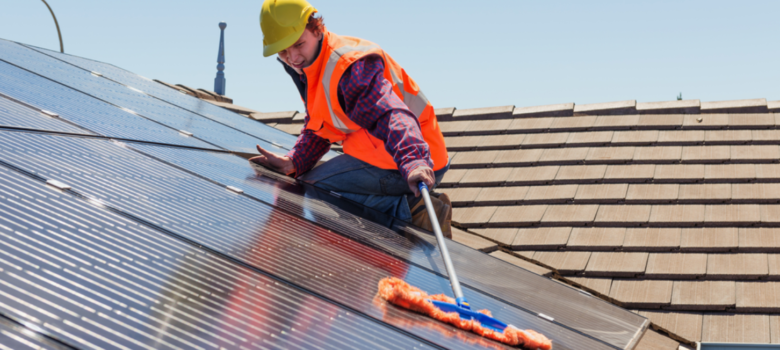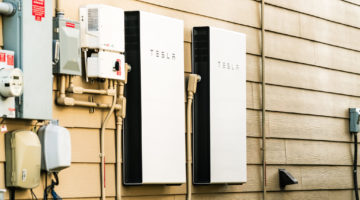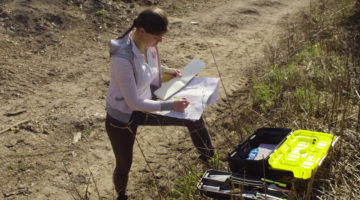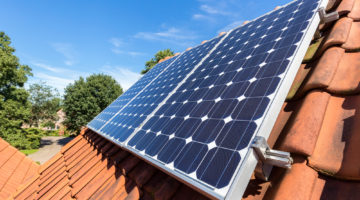
Harnessing solar energy has in recent years become such a widespread and mainstream way of generating power, that it’s hard to take a walk to the shops without seeing it. Solar panels are a popular choice for those wanting to generate their own electricity. They’re relatively quick to install, they’re use sustainable energy, and they can save you money while reducing your carbon footprint. They’re also a particularly low maintenance option, only requiring basic monitoring as well as cleaning three or four times a year. We’ve put together a handy guide on how to do these tasks to maintain your solar panels and maximise the returns.
Solar Panel Maintenance: Monitoring your Solar Panels
The best way to keep your solar panels at top efficiency is to stay on top of their health. Although they are designed to handle a vast array of weathers and conditions, external factors do play a roll. As the seasons change so do the flora and fauna of Britain, so bear in mind what each time of year brings. If you have tall trees around your property then Autumn could mean a build up of leaves on the the panels blocking their sunlight, while summer pollen is also a potential performance inhibitor.
Possibly the biggest problem for solar panels, however, are shadows. This is because solar panels are connected into ‘strings’ – if even one cell in a string is blocked, the output of the other panels in the string drops sharply. If some shading is inevitable, you can cheat this to a certain extent by arranging modules so that shadows will affect one whole string if possible, rather than the end cell of multiple strings. If your panels are even slightly shaded by large trees or nearby buildings, they will not work as effectively. Keep an eye on close trees and how their shadows fall, and be aware of new buildings that may block the light.
Solar Panel Maintenance: Cleaning your Solar Panels
Solar panels are pretty good at using natural rainfall to keep themselves free of heavy soiling, but in the same way that your windows still manage to collect grime from pollen, pollution and all forms of nature, so do your panels. To ensure that they operate to their optimum capacity it’s best to get them cleaned a few times a year. There are several options when it comes to cleaning solar panels:
- Use a solar panel cleaning company. This is certainly the easiest method, but perhaps the costliest. Simply search on the internet for a local window cleaner who offers the service to professionally clean your panels. They should use the appropriate cleaning products and tools to get your panels back up to 100%.
- HeliotexTM offer an automatic solar panel cleaning system that automatically washes and rinses your solar panels. This system attaches water nozzles to your solar panels, and houses a 20 litre store of soap concentrate, which is administered to the panels when required. The HeliotexTM system tends to be for large solar installations to make it cost effective.
- You can also buy a nano-coating that can be applied to the panels, much like polishing a car. When solar panels are treated with the nano-coating, its hydrophobic properties repel water and dirt as it comes into contact with the panels. Nanoshell and Smart shield both supply this material in the UK.
Of course there’s always the option to do it yourself. If you choose that route then be sure that you have safe access to the panels, and be extremely conscious of your choice of materials. It’s not like scrubbing a floor clean, harsh chemical and abrasive equipment are a big no-no. Simple dish soap and a cloth or soft bristled brush will do just fine. Use a squeegee to dry the panel and prevent a residue.
Solar Panel Maintenance: Checking your Solar Panel Usage
While the above are both important, they’re not exactly the way I want to spend my Sunday afternoons unless I need to. That’s why I’m a fan of our last solar maintenance tip – install a monitoring system to keep a running log of your panels performance and show you when there’s something wrong. This way you’re not wasting time or money cleaning a perfectly functioning panel or chopping down your favourite tree.
Monitoring systems allow you to identify when and often where there is a problem with your solar panels if they ever stop working. While the installation and monthly fees can put many people off, if you’re someone that likes to be entirely in control of their environment then a monitoring system can’t be beaten.
Think we missed something? Do you have a different opinion?
Comment below to get your voice heard…












We have had our panels fitted just prior to th change in rates of reimbursement but hav never had them cleaned. Can you recommend a reliable company in my location Cambridge, to carry out this service.